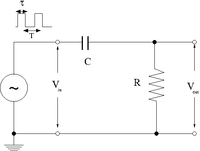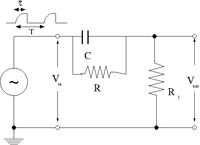Difference between revisions of "TF EIMLab6 Writeup"
| Line 18: | Line 18: | ||
: <math>R_1 C_1 = \tau_1 = (1 \times 10^3 \Omega ) (1 \times 10^{-6} F )= 0.001</math> s | : <math>R_1 C_1 = \tau_1 = (1 \times 10^3 \Omega ) (1 \times 10^{-6} F )= 0.001</math> s | ||
| − | : <math>R_1 C_1 = \ | + | : <math>R_1 C_1 = \tau_2 = (14 \times 10^{3} \Omega)(10.27 \times 10^{-12} F )= 1.46 \times 10^{-5}</math> |
:<math>\omega_1 = 100 rad/sec \Rightarrow \nu_1 = 100/2\pi = 16 Hz</math> | :<math>\omega_1 = 100 rad/sec \Rightarrow \nu_1 = 100/2\pi = 16 Hz</math> | ||
:<math>\omega_2 = 68,291 rad/sec \Rightarrow \nu_2 = 10,868 Hz</math> | :<math>\omega_2 = 68,291 rad/sec \Rightarrow \nu_2 = 10,868 Hz</math> | ||
| + | |||
| + | tek012 | ||
| + | |||
| + | |||
2.)Construct the circuit below selecting an RC combination such that RC <math>\approx</math> 1/10 | 2.)Construct the circuit below selecting an RC combination such that RC <math>\approx</math> 1/10 | ||
Revision as of 23:01, 8 February 2011
Lab 6 Pulses and RC Filters
Differentiator
1.) Adjust the pulse generator to output square pulses which at sec in time.
Possible capacitors
Possible Resistors
- s
tek012
2.)Construct the circuit below selecting an RC combination such that RC 1/10
3.)Measure and . Sketch a picture comparing and .
4.) Change the pulse width such that
5.)Measure and .Sketch a picture comparing and .
6.) Change the pulse width such that
7.)Measure .Sketch a picture comparing and .
Questions
1.) What happens if than amplitude of is doubled.
2.) What happens if R is doubled and C is halved?
Integrator
To illustrate the integrator circuit we need to have an input pulse which looks like the output of the above differentiator circuit. In other words, input a pulse whose output is obviously the integral of the input pulse.

